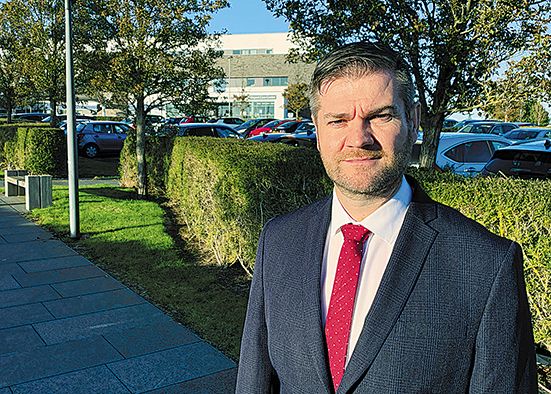Ambulance wait times now at ‘breaking point’
Ambulance wait times now at ‘breaking point’
19 March 2025

MANY patients across the district have had the misfortune to wait in the back of ambulances queued up outside the Ulster Hospital’s emergency department.
Successive initiatives by health administrators to address the issue have failed, while emergency ambulance response times across the district remain frighteningly alarming.
The Recorder has previously reported on people’s experience of waiting in the back of ambulances with the need to address the issue highlighted by local politicians and the Down Community Health Committee.
Lengthy handover times at the Ulster Hospital result in ambulances parked up and unable to respond to emergency calls elsewhere, with the impact felt especially in rural areas, which politicians and health campaigners consistently argue places lives at risk.
Last week, Northern Ireland’s auditor general, Dorinnia Carville, highlighted the “dramatic deterioration” in ambulance handover performance, warning it is placing an increasing number of patients at potential risk of “harm or even significant harm”.
Ms Carville said about 3,800 patients were potentially subjected to severe harm last year because of ambulance handover delays.
Her report – the recommendations of which the Department of Health said it would carefully consider – also identified that potentially more than 36,000 patients may have
experienced some harm and that delayed handovers cost about £50m over the past five years.
It considered the performance of the process of moving a patient from an ambulance into an emergency department to be seen by medical and nursing staff.
The overwhelming majority of emergency patients from the local area are transferred to the Ulster Hospital which has consistently recorded the longest handover times
Last December, the longest ambulance handover for a patient was 23 hours, although targets stipulate all handovers should be complete within 15 minutes.
This target has been comprehensively missed since 2019 said Ms Carville’s report and that in the past two years, only 7% of Northern Ireland Ambulance Service handovers met this target.
But one local politician believes the introduction of a handover model similar to one used at the busy emergency department at a leading London hospital could bring about a dramatic reduction, benefitting patients and getting ambulances back on the road.
South Down MLA Colin McGrath has unveiled a plan to tackle the handover issue after visiting St Thomas’s Hospital located in the heart of London’s Westminster and meeting representatives of the London Ambulance Service.
It includes proposals which look at replicating the success of the so-called W45 policy used by the London Ambulance Service which seeks to ensure a 45-minute handover period of patients by when arriving at hospitals.
The SDLP report is entitled ‘Help Can’t Wait’.
Mr McGrath said despite the best efforts of hardworking health and ambulance staff here, it has been clear for some time now that services are at “breaking point”.
He continued: “Images of ambulances lined up outside emergency departments have become common place, alongside stories from families who have spent hours waiting for an ambulance while their loved one was in extreme pain.
“We have even heard of people sadly passing away before an ambulance was able to reach them.”
Mr McGrath said his party has repeatedly pressed the NI Executive to deal with these issues and implement the transformation needed to overhaul the health service.
“Unfortunately, we have seen very little in the way of action. Put simply, someone experiencing a health emergency, whether at home or at an emergency department, can’t afford to wait and this is happening all too often at the minute,” he declared.
“In the absence of Executive intervention, I have been working on alternative proposals to address the issues within the ambulance service and EDs and release some pressure on these services.”
Mr McGrath was in London last week to meet with the London Ambulance Service and St Thomas’ Hospital to see their W45 policy in action.
“I was blown away with what I saw,” he declared.
“This system allows ambulance staff to hand patients over within 45 minutes, ensuring they get the care they need and ambulances can get back out and respond to others in need of emergency treatment. There’s no reason we can’t do this here.”
Mr McGrath said his party produced a number of proposals around implementing the W45 policy that would make major changes to healthcare here.
“By making the most of our existing staff, changing the way we work and investing modestly in recruitment, we can reduce handover times by 50%, freeing up 60,000 operational hours,” the MLA suggested.
“This would result in a better experience for both patients and staff and allow for some much-needed breathing room as our health service gets back on its feet.”
Mr McGrath said the SDLP Opposition wants to work constructively with Health Minister Mike Nesbitt to make these changes happen for the betterment of everyone.
He added: “This isn’t about blame or pointing the finger, it’s about delivering improved services for our people. Help can’t wait and the Executive shouldn’t either.”


